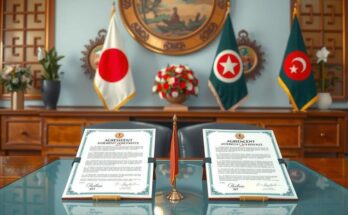The UN human rights chief has urged for the lifting of Western sanctions on Syria as the nation seeks to rebuild after the ousting of Bashar Assad. Emphasizing the need for transitional justice and human rights, he supports new authorities in their efforts for reform and rehabilitation. The prolonged conflict has left Syria in devastation, demanding urgent international assistance.
The United Nations human rights chief, Volker Türk, has recently advocated for the lifting of Western sanctions against Syria as the country embarks on a rebuilding phase following the removal of former leader Bashar Assad. During his visit to Syria, Türk emphasized the importance of transitional justice for the victims of the prolonged conflict, noting that it is vital for restoring public trust in governmental institutions under the new authority in the country.
Türk articulated that revenge and vengeance should not be pursued, highlighting the critical need for social cohesion and institutional reform. His discussions with Ahmad al-Sharaa, leader of Hayat Tahrir al-Sham, reflected the new leadership’s commitment to upholding human rights and developing a nation that serves all Syrians. The Syrian conflict, which erupted in early 2011, has resulted in approximately half a million fatalities and displacement of millions, leaving widespread infrastructure damage requiring substantial financial resources to mend.
Emphasizing the dire need for assistance, Türk stated, “The people of Syria need every ounce of help they can get to rebuild a country that works for all Syrians.” He also remarked on ongoing threats to Syria’s territorial integrity that necessitate respect by all parties. Türk insisted that sanctions imposed by European nations and the United States, established shortly after the onset of the conflict, must be reconsidered, particularly regarding their adverse effects on the civilian population.
Furthermore, a Syrian Interior Ministry representative disclosed the recent detention of an Egyptian militant, Ahmad al-Mansour, known for advocating the overthrow of the Egyptian government. Al-Mansour’s long-term residence in Syria and previous involvement in anti-Assad activities heighten concerns, yet his arrest may mitigate apprehensions among certain Arab nations about Syria being used for plotting against their governments.
This article discusses the current state of Syria following the civil war and the ousting of Bashar Assad. The UN human rights chief, Volker Türk, calls for the removal of Western sanctions, emphasizing that the Syrian population needs support to rebuild. The conflict has severely disrupted the country, leading to substantial loss of life and infrastructure, necessitating international aid and reconsideration of current policies affecting the nation.
In conclusion, the UN’s call for lifting sanctions on Syria highlights the urgent need for international cooperation to aid the recovery of the war-torn nation. The emphasis on human rights and transitional justice signifies a shift towards healing and reconciliation under new leadership. Additionally, addressing the humanitarian impact of ongoing sanctions will be crucial for fostering a stable and inclusive Syria moving forward.
Original Source: apnews.com




